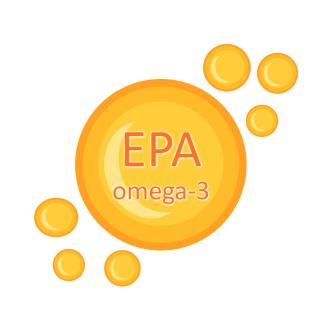
Eicosapentaenoic acid (EPA) is one of the essential omega-3 fatty acids, which means that it must be obtained through your diet since the human body cannot synthesize it on its own. EPA is crucial for various biological functions and offers many health benefits. Here is a detailed description of how you can get EPA:
- Fish: Fish, especially fatty fish, is one of the richest natural sources of EPA. Species such as salmon, sardines, mackerel, herring, and trout contain high concentrations of EPA. You can obtain EPA by including these fish in your diet. Fatty fish are the primary dietary source of EPA for most people.
- Fish Oil Supplements: If you don't regularly consume fish, fish oil supplements are a popular way to get EPA. These supplements come in various forms, including capsules and liquid. They provide a concentrated source of EPA and other omega-3 fatty acids. It's essential to follow the recommended dosage and consult a healthcare professional before starting any supplement regimen.
- Algae-Based Supplements: For vegetarians and vegans, who may not want to use fish-derived supplements, algae-based omega-3 supplements are available. Certain types of algae naturally contain EPA, and supplements made from these algae can provide a source of EPA.
- Fortified Foods: Some food products, such as milk, yogurt, eggs, and bread, are fortified with omega-3 fatty acids, including EPA. These fortified foods can be a convenient way to increase your EPA intake. Check product labels to ensure that they contain added EPA.
- Flaxseeds and Flaxseed Oil: While flaxseeds primarily provide alpha-linolenic acid (ALA), a different type of omega-3 fatty acid, a small portion of ALA is converted into EPA in the body. So, incorporating flaxseeds or flaxseed oil into your diet can contribute to your EPA intake, although it's not as efficient as obtaining EPA directly from fish or supplements.
- Nutritional Counseling: Consulting with a registered dietitian or healthcare provider can help you determine your specific EPA needs and guide you on how to incorporate it into your diet.
It's important to maintain a balanced diet that includes a variety of foods rich in omega-3 fatty acids, including EPA. These fatty acids offer numerous health benefits, particularly for heart health, brain function, and overall well-being. Including sources of EPA in your diet can help you enjoy these advantages.
Why is EPA (eicosapentaenoic acid) so important for the body?
Eicosapentaenoic acid (EPA) is a type of omega-3 fatty acid that is critically important for the human body due to its numerous health benefits. EPA is found primarily in marine sources, such as fatty fish and some algae. Here's a detailed explanation of why EPA is vital for the body:
- Cardiovascular Health:
- Reducing Inflammation: EPA has potent anti-inflammatory properties, which can help reduce systemic inflammation, a major contributor to cardiovascular diseases. Chronic inflammation in blood vessels can lead to atherosclerosis (hardening and narrowing of arteries).
- Lowering Triglycerides: EPA is known to lower levels of triglycerides in the blood. High triglycerides are a risk factor for heart disease, and EPA can help reduce this risk.
- Improving Cholesterol Profile: EPA can also improve the balance of "good" high-density lipoprotein (HDL) cholesterol to "bad" low-density lipoprotein (LDL) cholesterol, further reducing the risk of heart disease.
- Blood Pressure Regulation: EPA can help maintain healthy blood pressure levels, reducing the strain on the heart and blood vessels.
- Brain Health:
- Cognitive Function: EPA plays a crucial role in brain development and function. It is an essential component of cell membranes in the brain, supporting optimal communication between brain cells.
- Mood and Mental Health: EPA has been linked to improved mood and mental health. It may help reduce the symptoms of depression, anxiety, and other mood disorders.
- Inflammatory Disorders:
- EPA is effective in managing various inflammatory conditions, such as rheumatoid arthritis. It can help reduce joint pain and stiffness in people with inflammatory joint diseases.
- Eye Health:
- EPA, along with other omega-3 fatty acids, helps maintain the health of the retina and may reduce the risk of age-related macular degeneration (AMD) and other eye conditions.
- Autoimmune Diseases:
- EPA may play a role in regulating the immune response in autoimmune diseases. It can help mitigate symptoms and reduce inflammation in conditions like lupus and multiple sclerosis.
- Skin Health:
- EPA contributes to skin health by maintaining the integrity of the skin barrier and helping manage conditions like psoriasis.
- Pregnancy and Child Development:
- EPA is essential during pregnancy and breastfeeding, as it supports the development of the fetal brain and nervous system. Adequate EPA intake is crucial for the healthy growth of a baby.
- Cancer Prevention: While more research is needed, some studies suggest that EPA and other omega-3 fatty acids may have a protective effect against certain types of cancer, particularly colorectal cancer.
- Immune Function:
- EPA may help modulate the immune system's response, promoting a balanced and efficient immune function.
It's important to note that EPA often works in conjunction with another omega-3 fatty acid, docosahexaenoic acid (DHA), to exert these health benefits. A balanced intake of both EPA and DHA is recommended for optimal results.
To obtain EPA, individuals can consume foods rich in omega-3 fatty acids, like fatty fish (e.g., salmon, mackerel, sardines), fish oil supplements, or algae-based supplements. Ensuring an adequate intake of EPA in your diet can have a positive impact on your overall health and well-being. If you have specific health concerns or conditions, it's advisable to consult with a healthcare professional or registered dietitian for personalized guidance on incorporating EPA into your diet.






